- Home
- Milan Kundera
Farewell Waltz Page 10
Farewell Waltz Read online
Page 10
ensuring that Saint Simeon could die on his pillar surrounded by the love and admiration of the world."
Olga listened attentively, and upon hearing Bertlef's last words she began to laugh.
"That tremendous desire for admiration has nothing laughable about it, I find it rather moving," said Bertlef. " Someone who desires admiration is attached to his fellow men, he cares about them, he cannot live without them. Saint Simeon Stylites is alone in the desert on a square meter of pillar. And yet he is with all mankind! He imagines millions of eyes raised toward him. He is present in millions of thoughts, and this delights him. It is a great example of love for mankind and love for life. You would not suspect, dear young lady, to what extent Simeon Stylites continues to live in every one of us. And to this day he is the better of the polarities of our being."
Someone knocked at the door, and in came a waiter pushing a cart loaded with food. He spread a tablecloth and set the table. Bertlef dug into the cigar box and stuffed a fistful of coins into the waiter's pocket. Then they all began to eat, with the waiter behind them pouring wine and serving the various dishes.
Bertlef commented greedily on the tastiness of each dish, and Skreta remarked that he didn't know how long it had been since he had had such a good meal. "Maybe the last time was when my mother was still cooking for me, but I was still little then. I've been an orphan since the age of five. After that, the world around me was a strange world, and the cooking also
seemed strange to me. The love of food arises from the love of the nearest and dearest."
"Quite right," said Bertlef, lifting a mouthful of beef to his lips.
"A forsaken child loses its appetite," Skreta went on. "Believe me, to this day I feel bad about having no father or mother. Believe me, to this day, and as old as I am, I'd give anything to have a papa."
"You overestimate family affinities," said Bertlef. "Everyone is your nearest and dearest. Don't forget what Jesus said when they tried to call him back to his mother and brothers. He pointed to his disciples and said: cHere are my mother and my brothers.'"
"And yet the Holy Church," Dr. Skreta ventured to reply, "didn't have the slightest desire to abolish the family or to replace it with a community open to every-one.
"There is a difference between the Holy Church and Jesus. And to my mind Saint Paul, if you will allow me to say so, is not only the successor but also the falsifier of Jesus. First there is the sudden change from Saul to Paul! As if we have not known enough of those passionate fanatics who trade one faith for another in the course of a night! And let no one tell me that the fanatics are guided by love! They are moralists muttering their ten commandments. But Jesus was not a moralist. Remember what he said when they reproached him for not celebrating the Sabbath: 'The Sabbath was made for man, and not man for the Sabbath.' Jesus loved women! And can you picture Saint Paul with the fea-
tures of a lover? Saint Paul would condemn me because I love women. But Jesus would not. I don't see anything bad about loving women, many women, and about being loved by women, many women." Bertlef smiled, and his smile expressed great self-satisfaction: "My friends, I have not had an easy life, and more than once I have looked death in the eye. But in one thing God has shown himself to be generous to me. I have had a multitude of women, and they have loved me."
The guests finished their meal, and the waiter was beginning to clear the table when there was another knock at the door. It was weak, shy knocking, as if begging for encouragement. "Come in!" said Bertlef.
The door opened, and a child came in. It was a little girl about five years old; she was wearing a ruffled white dress belted with a broad white ribbon tied in back with a huge bow looking like a pair of wings. She was holding a flower by the stem: a large dahlia. Seeing in the room so many people who all seemed to be staring dumbfounded at her, she stopped, not daring to go farther.
Then Bertlef, beaming, stood up and said: "Don't be afraid, little angel, come on in."
And the child, as though she were seeing support in Bertlef's smile, burst out laughing and ran over to Bertlef, who accepted the flower and kissed her on the forehead.
The guests and the waiter watched this scene with surprise. With the huge white bow on her back, the child really did look like a little angel. And Bertlef, bending over her with the dahlia in his hand, made one
think of the Baroque statues of saints to be seen in the country's small towns.
"Dear friends," he said, turning to his guests, "I have had a very pleasant time with you, and I hope that you too have enjoyed yourselves. I would gladly stay with you late into the night, but as you can see, I am unable to. This beautiful angel has come to summon me to a person who is waiting for me. I told you that life has struck me with all kinds of blows, but women have loved me."
Bertlef held the dahlia against his chest with one hand and with the other touched the little girl's shoulder. He bowed to his small group of guests. Olga thought him ridiculously theatrical, and she was delighted to see him go and that, finally, she would soon be alone with Jakub.
Bertlef turned around and, taking the little girl's hand, headed toward the door. But before leaving the room he bent over the cigar box to fill his pocket with an ample fistful of coins.
11
The waiter stacked the dirty dishes and empty bottles on the cart, and when he had left the room, Olga asked: "Who is that little girl?"
"I've never seen her before," said Skreta.
"She really did have the look of a little angel," said Jakub.
"An angel who procures mistresses for him?" said Olga.
"Yes," said Jakub. "A procurer and go-between angel. It's exactly how I picture his guardian angel."
"I don't know if she's an angel," said Skreta, "but what's curious is that I've never seen this little girl before, although I know nearly everybody around here."
"In that case there's only one explanation," said Jakub. "She's not of this world."
"Whether she's an angel or the chambermaid's daughter, I can guarantee you," said Olga, "that he hasn't gone to meet a woman! He's a terribly vain character, and all he does is brag."
"I find him likable," said Jakub.
"He might well be," said Olga, "but I still insist he's the vainest kind of character. I'm willing to bet that an hour before we arrived he gave some of those fifty-cent coins to that little girl and asked her to come here at a certain time holding a flower. Believers have a great talent for staging miracles."
"I very much hope you're right," said Dr. Skreta. "Because Mister Bertlef is actually a very sick man, and a night of love would expose him to great danger."
"You see, I was right. All his hints about women are just bluster."
"My dear young woman," said Dr. Skreta, "I'm his
physician and his friend, and yet I'm not so sure. I don't know."
"Is he really so ill?" asked Jakub.
"Why do you think he's been staying here for nearly a year now, and his young wife, to whom he's very attached, comes to see him only now and again?"
"And all of a sudden it's a bit dreary here without him," said Jakub.
True, all three suddenly felt orphaned and not at home in the room, and they had no wish to stay any longer.
Skreta got up from his chair: "You and I are going to take Miss Olga home, and then we'll go for a walk. We've got a lot of things to discuss."
Olga protested: "I don't want to go to sleep yet!"
"On the contrary, it's high time. I'm ordering you to as your physician," Skreta said sternly.
They left the Richmond and headed across the park. On the way Olga found an opportunity to say softly to Jakub: "I wanted to spend the evening with you…"
But Jakub merely shrugged his shoulders, for Skreta was imperiously imposing his will. They escorted the young woman to Karl Marx House, and in his friend's presence Jakub did not even pat her on the head, as he usually did. The doctor's antipathy toward her plumlike breasts had deterred him. He saw the disappoint
ment in Olga's face and was annoyed with himself for distressing her.
"So what do you think?" asked Skreta when he found himself alone with his friend on the path. "You
heard me say I need a father. It would have wrung tears from a stone. But he started talking about Saint Paul! Is it really so hard for him to understand? For two years now I've been telling him I'm an orphan, two years praising the advantages of an American passport. I've alluded a thousand times in passing to various adoption cases. I figured all these allusions would have given him the idea of adopting me long ago.
"He's too absorbed in himself," said Jakub.
"That's so," Skreta agreed.
"If he's seriously ill, that's not surprising," said Jakub. "Is he really as sick as you said he is?"
"It's really worse," said Skreta. "Six months ago he had his second and very serious heart attack, and since then he hasn't been allowed to travel far, and he lives here like a prisoner. His life hangs by a thread. And he knows it."
"You see," said Jakub, "in that case you should have realized a long time ago that the allusions method is no good, because any allusion only causes him to think about himself. You should make your request directly. He certainly will agree, because he likes to please people. It fits with his idea of himself. He wants to give people pleasure."
"You're a genius!" Skreta exclaimed, coming to a stop. "It's simple once you think of it, and exactly right! Like an idiot I've wasted two years of my life because I didn't know how to figure him out! I've spent two years of my life going about it in roundabout ways!
And it's your fault, because you should have advised me long ago."
"You should have asked me long ago!"
"You haven't come to see me for two years!"
The two friends strolled on in the dark park, breathing in the crisp early autumn air.
"I made him a father," said Skreta, "so maybe I deserve his making me his son!"
Jakub agreed.
"What's unfortunate," Skreta went on after a long silence, "is that one is surrounded by idiots. Is there anyone in this town I can ask for advice? Merely by being born intelligent, you right away find yourself in absolute exile. I don't think about anything else, because it's my specialty: mankind produces an incredible quantity of idiots. The more stupid the individual, the more he wants to procreate. The perfect creatures at most engender a single child, and the best of them, like you, decide not to procreate at all. That's a disaster. And I spend my time dreaming of a world a man would come into not among strangers but among brothers."
Jakub listened to Skreta's speech without finding much of interest in it.
Skreta went on: "Don't think those are just words! I'm not a politician but a physician, and the word 'brother' has an exact meaning for me. Brothers are those who have at least a mother or a father in common. All of Solomon's sons, even though they had a hundred different mothers, were brothers. That must have been marvelous! What do you think?"
Jakub breathed the crisp air and could not think of anything to say.
"Of course," Skreta went on, "it's very hard to force people while they're having sex to take an interest in future generations. But that's not what it's about. In our century there should really be other ways of solving the problem of rational procreation of children. We can't go on forever mixing up love and procreation."
Jakub approved of that idea.
"But you're only interested in detaching love from procreation," said Skreta. "For me, instead, it's a matter of detaching procreation from love. I want to initiate you into my project. It was my semen in that test tube."
This time he got Jakub's attention.
"What do you say to that? "
"It's a marvelous idea," said Jakub.
"It's extraordinary!" said Skreta. "By this procedure I've already cured quite a few women. Don't forget that many women can't have children only because it's the husbands who are sterile. I have a large clientele from all over the country, and for the last four years I've been in charge of gynecological examinations at the town clinic. It's no big deal to fill a syringe from a test tube and then deposit the seminal fluid into a woman being examined.''
"So how many children do you have?"
"I've been doing this for several years, but I can only make a very approximate tally. I can't always be certain I'm the father because my patients are, so to speak,
unfaithful to me with their husbands. And besides, they go back home, and it happens that I don't find out if the treatment succeeded. Things are clearer with the local patients."
Skreta fell silent, and Jakub gave himself up to tender reverie. Skreta's project delighted and moved him, for in it he recognized his old friend the incorrigible dreamer: "It must be terrific to have children with so many women," he said.
"And they're all brothers," Skreta added.
They strolled on, breathing the fragrant air in silence. Then Skreta resumed talking: "You know, I often tell myself that even though there are a lot of things here we don't like, we're responsible for this country. It infuriates me that I can't travel abroad freely, but I could never defame my country. I'd have to defame myself first. And which one of us has ever done anything to make this country better? Which one of us has ever done anything to make it possible to live here? To make it be a country where you could feel at home? Simply to feel at home…" Skreta now spoke more softly, tenderly: "Feeling at home is being among one's own. And because you said you're leaving, I've thought that I have to persuade you to take part in my project. I've got a test tube for you. You'll be abroad, and your children will be brought into the world here. And in ten or twenty years you'll see what a splendid country this will be!"
There was a round moon in the sky (it will stay there until the last night of our story, which we could there-
fore call a lunar story), and Dr. Skreta accompanied Jakub back to the Richmond. "You don't have to leave tomorrow," he said.
"I have to. They're waiting for me," said Jakub, but he knew that he would let himself be persuaded.
"Nonsense," said Skreta. "I'm glad you like my project. Tomorrow we're going to discuss it in detail."
Fourth Day
1
Mrs. Klima was getting ready to leave, but her husband was still in bed.
"Don't you also have to leave this morning?" she asked him.
"Why hurry? I've got plenty of time to get to those morons," Klima replied. He yawned and turned over.
He had announced to her two days before, in the middle of Tuesday night, that at the exhausting conference he had just come back from he had been pressured to help amateur bands and thus forced into giving a concert in a small spa town on Thursday evening with a jazz-playing pharmacist and physician. He had shouted all this angrily, but Mrs. Klima looked him in the face and clearly saw that his indignant curses were insincere, that there was no concert and Klima had invented it only to provide himself some time for one of his love intrigues. She could read everything on his face; he could never hide anything from her. Now, as he swore, yawned, and turned over, she realized instantly that he was doing so not out of sleepiness but to hide his face and prevent her from scrutinizing it.
Then she left for work. When, some years earlier, her illness had deprived her of her place in front of the
footlights, Klima found her a job at the theater as a secretary. It was not unpleasant, she met interesting people every day, and she was fairly free to arrange her own work schedule. Now she sat down in her office to write several official letters, but she could not manage to concentrate.
Nothing absorbs a human being more completely than jealousy. When Kamila lost her mother a year earlier, it was certainly an event more tragic than one of the trumpeter's escapades. And yet the death of her mother, whom she loved immensely, caused her less pain. The pain of her grief was benignly multicolored: there was sadness in it, and longing, emotion, regret (had Kamila taken sufficient care of her mother? had she neglected her?), even a serene smile. That pai
n was benignly dispersed in all directions: Kamila's thoughts rebounded from her mother's coffin and flew off toward memories, toward her own childhood and, still further, toward her mother's childhood, they flew off toward dozens of practical concerns, they flew off toward the future, which was wide open and where, as consolation (yes, in those exceptional days her husband was her consolation), Klima's figure stood outlined.
The pain of jealousy, on the contrary, did not move about in space, it turned like a drill on a single point. There was no dispersal. If her mother's death had opened the door to a future (different, more lonely, and also more adult), the suffering caused by her husband's infidelity opened no future at all. Everything was concentrated on a single (and perpetually present) image
of an unfaithful body, on a single (and perpetually present) reproach. When she lost her mother, Kamila could listen to music, she could even read; when she was jealous she could do nothing at all.
The day before, she had already gotten the idea of going to the spa town so as to check on the existence of the suspect concert, but she immediately gave it up because she knew that her jealousy would horrify Klima and that she must not overtly reveal it to him. But jealousy ran inside her like a racing engine, and she was unable to resist picking up the telephone and dialing the railroad station. In self-justification she told herself that she was phoning absentmindedly, with no particular intent, because she was unable to concentrate on administrative correspondence.
When she learned that the train departed at eleven, she imagined herself going up and down unfamiliar streets in search of a poster with Klima's name on it, asking at the tourist bureau if they knew about a concert to be given by her husband, being told there is no such concert, and then wandering, wretched and betrayed, through a strange and deserted town. And then she imagined Klima talking about the concert the next day and questioning him about the details. She would look him in the face, listen to his inventions, and drink the poisonous brew of his lies with bitter pleasure.

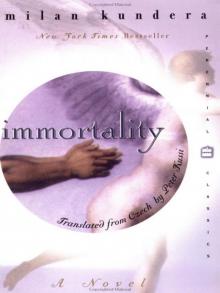 Immortality
Immortality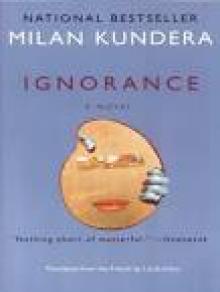 Dr. Havel After Twenty Years
Dr. Havel After Twenty Years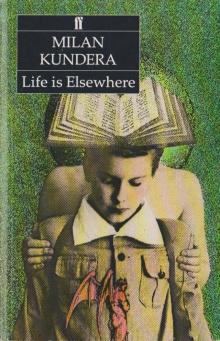 Life Is Elsewhere
Life Is Elsewhere Laughable Loves
Laughable Loves Symposium
Symposium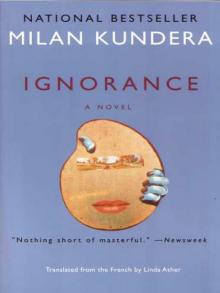 Ignorance
Ignorance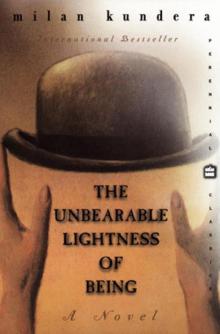 The Unbearable Lightness of Being
The Unbearable Lightness of Being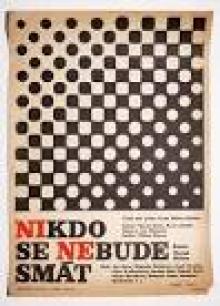 Nobody Will Laugh
Nobody Will Laugh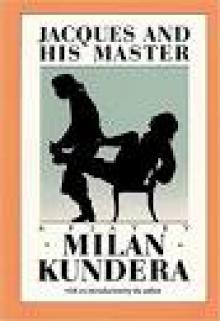 Jacques and His Master: An Homage to Diderot in Three Acts
Jacques and His Master: An Homage to Diderot in Three Acts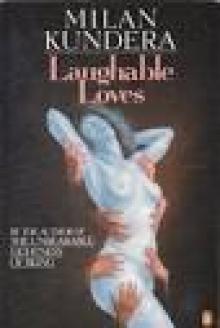 The Golden Apple of Eternal Desire
The Golden Apple of Eternal Desire Eduard & God
Eduard & God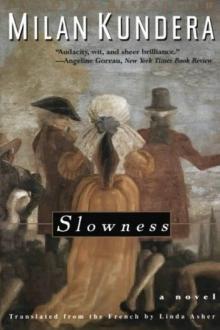 Slowness
Slowness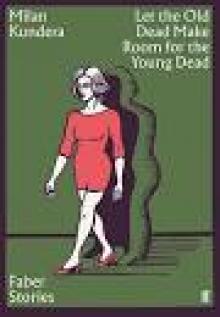 Let the Old Dead Make Room for the New Dead
Let the Old Dead Make Room for the New Dead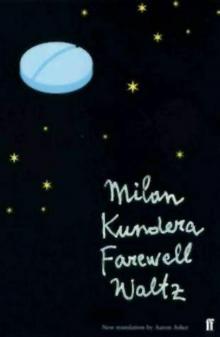 Farewell Waltz
Farewell Waltz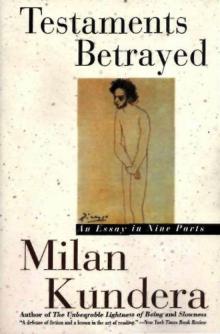 Testaments Betrayed: An Essay in Nine Parts
Testaments Betrayed: An Essay in Nine Parts